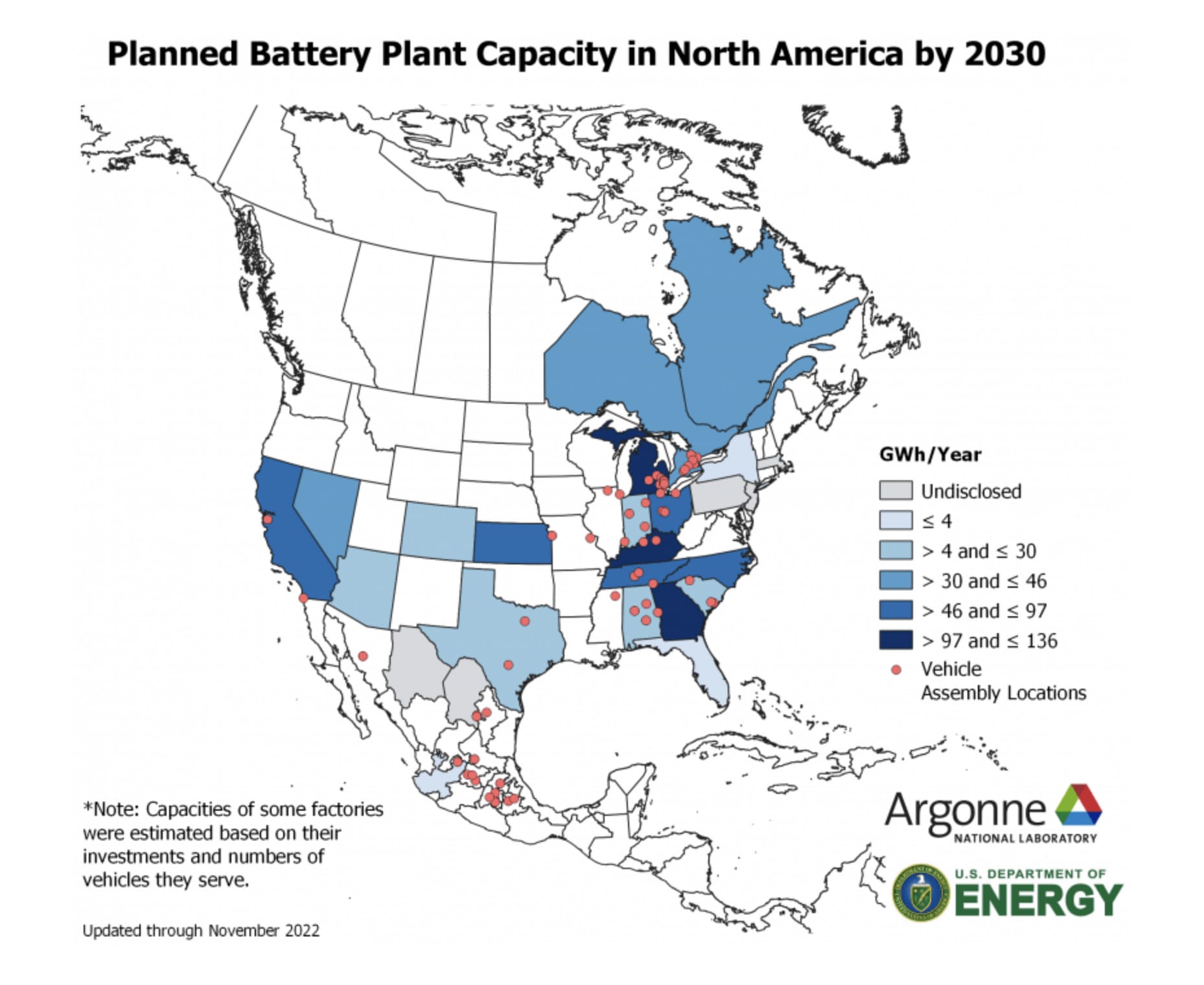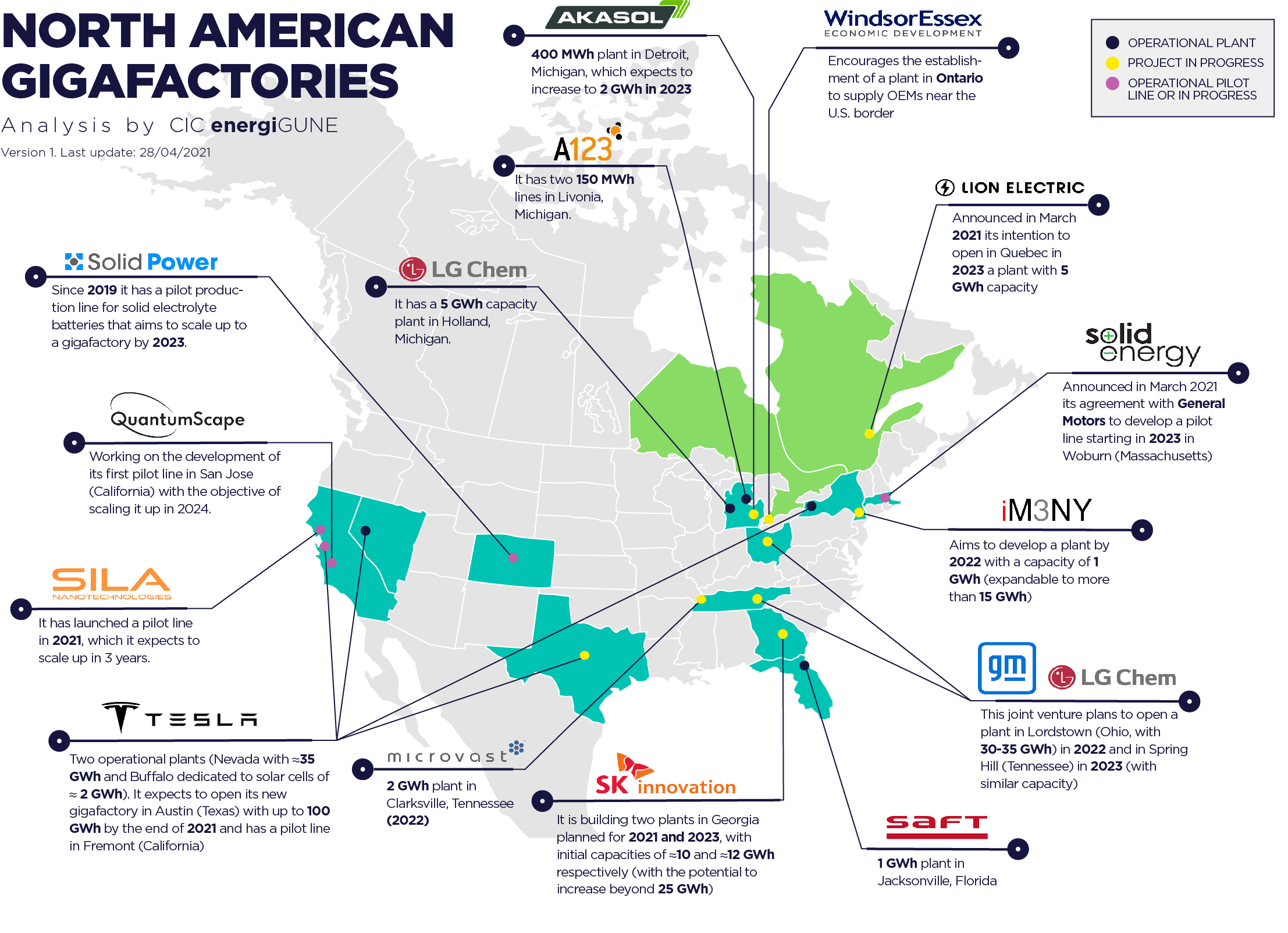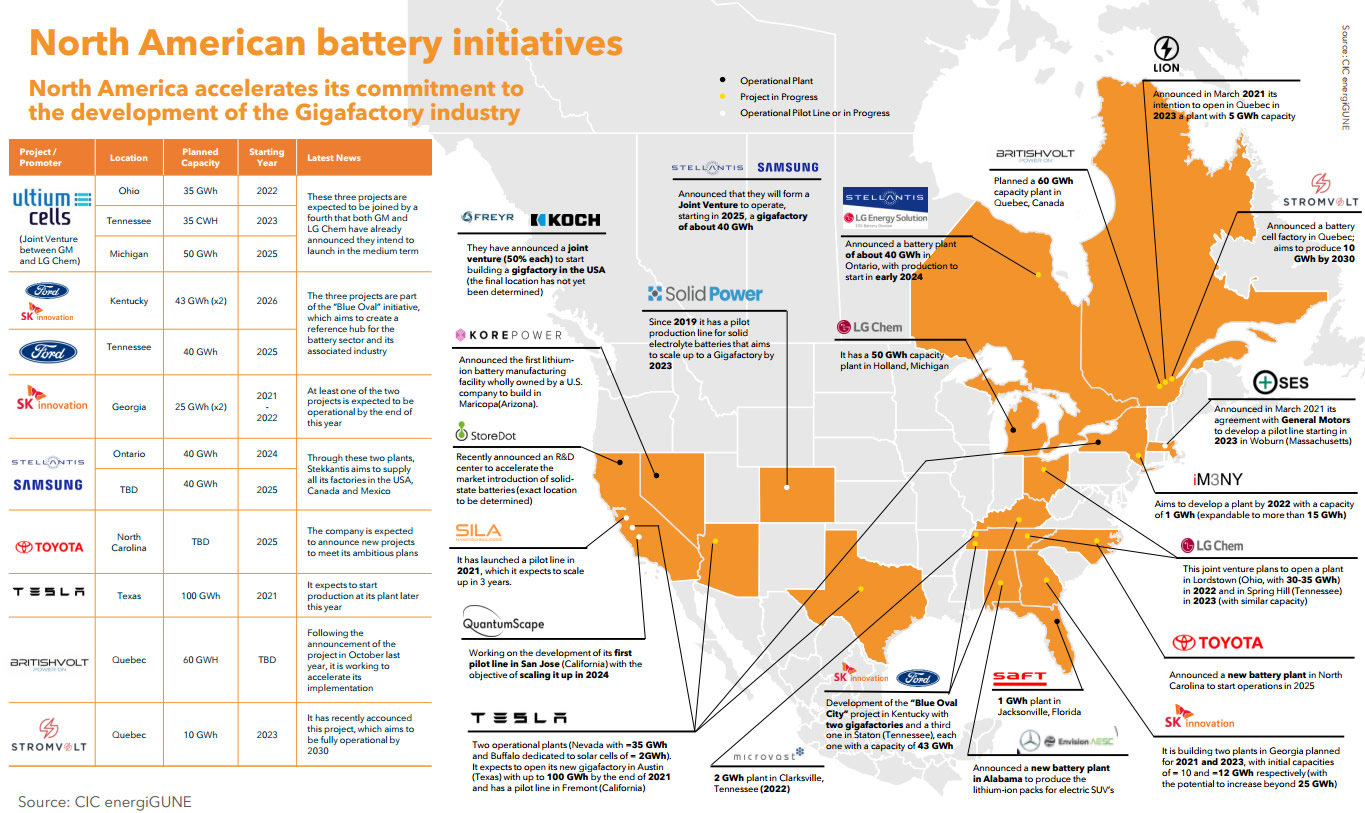Manufacturers will be able to apply for grants through the DOE’s Office of Manufacturing and Energy Supply Chains or for preferable debt financing through the DOE’s Loan Program Office. Preference will be given to companies with plants in communities with a history of automotive manufacturing and to projects that commit to paying high wages for production workers and maintain collective bargaining agreements.
__________________________________________________________________________________
Biden offers $15.5B to boost battery and EV manufacturing
The United States Department of Energy is dedicating $15.5 billion to support the transition to electric vehicles.
As part of President Joe Biden’s Investing in America agenda, most of the money will go to automakers and suppliers to retool their plants to produce electric, hybrid and hydrogen fuel cell electric vehicles, the agency said Thursday. A total of $12 billion ($2 billion in grants and $10 billion in loans) will directly support automotive manufacturing conversion projects for light-, medium- and heavy-duty EVs.
The remaining $3.5 billion will go toward expanding domestic manufacturing of batteries for EVs and the nation’s grid, as well as battery materials and components that have historically been imported from other countries. This is the second tranche of funding for battery materials and manufacturing that the DOE has made available.
Over the past few years, a range of automakers and battery manufacturers have shared plans to build battery manufacturing facilities on U.S. soil. The wave of onshoring began as the COVID-19 pandemic clogged up supply chains and made getting critical battery materials, most of which are produced in China, difficult. The passage of the Inflation Reduction Act in August 2022 has only boosted domestic manufacturing efforts — the IRA is rife with incentives for manufacturers, although the Treasury still needs to provide guidance on many of the bill’s initiatives.
The federal investments into domestic EV and battery manufacturing are in line with the Biden administration’s commitment to bringing high-paying manufacturing jobs to Americans, particularly in conservative states like Georgia, North Carolina and Tennessee.
Manufacturers will be able to apply for grants through the DOE’s Office of Manufacturing and Energy Supply Chains or for preferable debt financing through the DOE’s Loan Program Office. Preference will be given to companies with plants in communities with a history of automotive manufacturing and to projects that commit to paying high wages for production workers and maintain collective bargaining agreements.
DOE Funding Will Retrofit Existing Automotive Manufacturing Facilities Across the Country, Expand and Retain High-Paying Auto Manufacturing Jobs, and Bolster Domestic Supply Chains, Part of President Biden’s Investing in America Agenda to Create Not Just More Jobs But Good Jobs, Including Union Jobs
WASHINGTON, D.C. — As part of President Biden’s Investing in America agenda the U.S. Department of Energy (DOE) announced a $15.5 billion package of funding and loans primarily focused on retooling existing factories for the transition to electric vehicles (EVs)—supporting good jobs and a just transition to EVs.
This includes making available $2 billion in grants and up to $10 billion in loans to support automotive manufacturing conversion projects that retain high-quality jobs in communities that currently host these manufacturing facilities.
In the Domestic Conversion Grant Program, higher scores will be given to projects that are likely to retain collective bargaining agreements and/or those that have an existing high-quality, high-wage hourly production workforce, such as applicants that currently pay top quartile wages in their industry.
The Department also announced a Notice of Intent to make available $3.5 billion in funding to expand domestic manufacturing of batteries for electric vehicles and the nation’s grid, as well for battery materials and components currently imported from other countries.
The Notice of Intent outlines how DOE will support growing domestic industry while also supporting manufacturing workers and promoting equity and environmental justice.
Together, these federal investments underscore President Biden’s deep commitment to helping retain and expand high-paying manufacturing jobs while empowering workers to have a strong voice in and capture the economic benefits of the clean energy transition. The President's Investing in America agendais also enhancing our national security by building up the domestic supply chains necessary to reach the Administration’s ambitious climate goals.
“President Biden is investing in the workforce and factories that made our country a global manufacturing powerhouse,” said U.S. Secretary of Energy Jennifer M. Granholm. “Today’s announcements show that President Biden understands that building the cars of the future also necessitates helping the communities challenged by the transition away from the internal combustion engine.”
Depending on their capital needs, manufacturers can apply to receive assistance via financial grants through DOE’s Office of Manufacturing and Energy Supply Chains (MESC) or preferable debt financing through DOE’s Loan Program Office.
Converting and Retrofitting America’s Manufacturing Plants
DOE today announced a new $2 billion funding opportunity to spur the conversion of long-standing facilities to manufacture electric vehicles and components.
- This program will expand manufacturing of light-, medium-, and heavy-duty electrified vehicles and components and support commercial facilities including those for vehicle assembly, component assembly, and related vehicle part manufacturing.
- The program aims to support a just transition for workers and communities in the transition to electrified transportation, with particular attention to communities supporting facilities with longer histories in automotive manufacturing.
- Preference will also be given to projects that commit to pay high wages for production workers and maintain collective bargaining agreements.
- This funding supports goals and targets detailed in the 100-day reviews under Executive Order 14017“America’s Supply Chains and the Federal Consortium for Advanced Batteries’ National Blueprint for Lithium Batteries,” which provides a path to building a strong domestic battery supply chain and accelerating the development of a robust, secure, and equitable domestic industrial base by 2030.
Concept papers are due October 2, 2023, and the deadline for full applications is December 7, 2023. Learn more about this funding opportunity.
Leveraging Loan Authority for Automotive Manufacturing Conversion Projects
- Examples include retaining high wages and benefits, including workplace rights, or commitments such as keeping the existing facility open until a new facility is complete, in the case of facility replacement projects.
- For projects that seek financing to convert or directly replace an existing factory that has high-quality jobs, DOE will assess the projected economic impacts of the facility conversion relative to the existing facility, including factors such as contribution to the local economy, employment history, anticipated employment, and duration of its existence. Interested applicants can learn more about how to apply for these projects here.
DOE also announced today its intent to invest approximately $3.5 billion to boost production of advanced batteries and battery materials that are critical to rapidly growing clean energy industries of the future, including electric vehicles and energy storage. This notice of intent—made possible by the President’s Bipartisan Infrastructure Law—represents the second round of funding for battery materials processing and battery manufacturing grants to support the creation of new, retrofitted, and expanded domestic commercial facilities for battery materials, battery components, and cell manufacturing. The Notice of Intent outlines how round II will support growing domestic industry, supporting manufacturing workers, and promote equity and environmental justice. The program will support communities with experienced auto workers and a history of producing vehicles, applicants with strong workforce practices, and applicants who plan to create high-quality jobs.
Today’s announcements were made possible by President Biden’s Investing in America agenda which is growing the American economy from the bottom up and middle-out by rebuilding our nation’s infrastructure, driving over $500 billion in private sector manufacturing and clean energy investments in the United States, creating good-paying jobs and supporting collective bargaining, and building a clean-energy economy that will combat the climate crisis and make our communities more resilient.
- Both the conversion grant funding opportunity and battery manufacturing notice of intent will be administered by MESC.
- Conversion Project loans are made available by ATVM, administered by LPO.
- Learn more about ATVM projects and eligibility requirements.









No comments:
Post a Comment